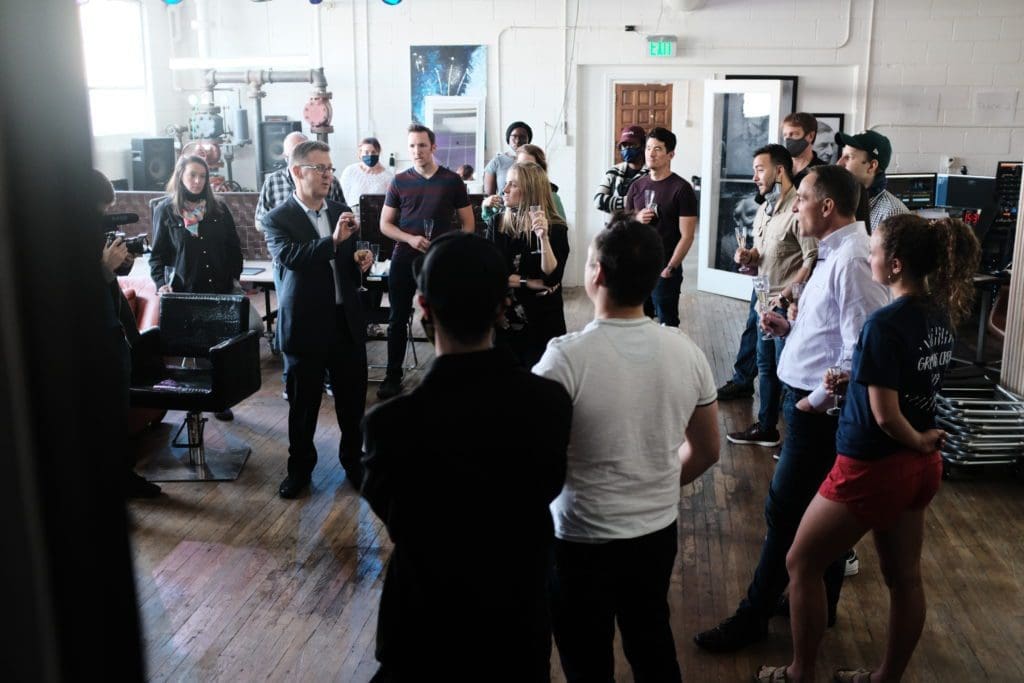
Last week the fintech industry gathered online for the eighth annual LendIt Fintech USA conference. This was an event like no other. It was the first ever major fintech event held completely online. While organizing this event had its challenges, we couldn’t have been happier with the way it all came together.
While LendIt Fintech USA 2020 was supposed to be held in New York City at the Javits Center we made the call in early June to switch to a 100% virtual event. So, on September 29 I found myself at a Denver TV production studio, along with my fellow LendIt co-founder Bo Brustkern as well as colleagues Joy Schwartz and Matt Murnane. The rest of the LendIt team supported the event from their home offices.
We decided early on to put a great deal of effort into production. This was not going to a boring Zoom conference, it was going to look more like a network TV show. I think we pulled that off.
Now, on to some of the highlights. We had, in my opinion, our best keynote roster ever and it didn’t disappoint.
Keynotes – Day 1
We kicked it off with Stephanie Cohen, the Chief Strategy Officer of Goldman Sachs. It was interesting timing to have her kick off the show because just that morning she received news that she was being promoted as part of a restructuring within Goldman and will become co-head of the consumer and wealth management division. She is also being talked about as a potential successor to CEO David Solomon.
There were a couple of striking parts of Stephanie’s keynote. One, she said that Goldman Sachs is looking to partnering with fintech companies and in fact, wants to be known as the partner of choice. She also talked about their consumer strategy and their plans to be a full service digital bank. And what really interesting was how she thinks about Goldman Sachs as a platform company where they embed their capabilities with other companies. An example she gave was their partnership with Apple on the Apple Card.
I had the pleasure of interviewing Craig Boundy, the CEO of Experian North America. He talked about the importance of working together during this difficult time particularly around the reporting of forbearance. He said we have seen unparalleled collaboration between the three credit bureaus, lenders and regulators this year. He also talked about the importance of consumers taking control of their own financial data.
Experian Boost allows consumers to connect their utility and phone bill history to their credit report and this is having a major impact on consumer’s credit scores, an average instant increase of 13 points. Craig said that, when doing this, that 64% of consumers with “poor” credit move into the “fair” category, thereby unlocking credit opportunities that would have been unavailable to them before.
Brian Brooks, the acting head of the OCC, is one of the most creative thinkers ever to lead a regulatory agency. He shared many of his ideas with the LendIt audience including details of Project REACh, the initiative focused on financial inclusion and greater access to credit and capital that has many members of the LendIt community participating. He talked about equity co-investment (pioneered by companies like Unison and Point) as a way to reimagine how home financing works.
He, of course, discussed national charters and why this country needs the chartering system to take into account the unbundling that is happening today. But my favorite message he had for incumbents banks was that it is too late to build a moat around your business. The challengers are here and they are big, because customers like them. It needs to be easier for banks to benefit from fintech innovation and he sees his job as trying to make that happen.
Kabbage co-founders Rob Frohwein and Kathryn Petralia told the incredible story of how they were able to originate 300,000 PPP loans, the second largest number of any lender, after Bank of America. Rob Frohwein said, that is many ways Kabbage was built for the PPP. With a heavy emphasis on automation and speed they knew that they could make a significant impact for small businesses.
Kathryn Petralia said that fully 80% of the PPP applications went through a fully automated process. There was no way a company the size of Kabbage, with 300 employees, could process that many loans without such a high level of automation. They built partnerships with 135 community banks very quickly in the early days of the PPP because they couldn’t fund all the loans themselves. But then they were able to access the PPP Liquidity Facility, one of the only fintechs to do so, and offload the loans to the Federal Reserve.
Keynotes – Day 2
Day two began with the CEO of SoFi, Anthony Noto. He made it clear that SoFi wants to become a top 10 financial institution in the coming years and their sponsorship of the NFL stadium bearing their name will help them become a household name, an important step in that process. He shared what SoFi did to help with the PPP, even though they are not a small business lender, and what that program has meant for fintech overall. He said it showed the importance of building digital distribution and only digital companies could scale a new program so quickly. He also said that incumbent banks really need to rethink their technology stacks because they can no longer have a subpar digital offering.
Anthony also shared that while other industries (e-commerce, online travel, online media) have seen technology-first companies become market leaders, in financial services this has not happened yet. There are 500 million bank accounts tied to 5,000 plus banks so there is a lot of market share to be taken by companies like SoFi.
FDIC Chairman Jelena McWilliams offered a blunt warning to banks that are not focused on innovation. She is concerned that community banks are going to go the way of Blockbuster if they do not modernize their technology. The status quo is no longer an option.
She also tackled the challenge of inclusion and diversity in banking. She wondered whether the FDIC is doing enough here. They have created a diversity task force within the FDIC to look at their own hiring decisions, retention and advancement for minorities. And they are also looking at helping banks become more diverse as well.
Chairman McWilliams also talked about new ways to enable community banks to partner with fintechs more easily. There could be an FDIC seal of approval for fintechs that will make the onboarding process much easier for banks when they want to partner.
I interviewed Noah Breslow, CEO of OnDeck and David Fisher, CEO of Enova, who have come together in the first blockbuster deal of the pandemic. We talked about the synergies between the two companies that made this a good deal for both and how the deal unfolded. Noah shared why Enova was the best fit for OnDeck and why it was the best outcome for OnDeck shareholders and employees. He talked about the data synergies between the two business. David talked about the cost savings that will result from the transaction and the expertise that Enova is gaining here.
Noah also shared his views on the future of online lending, that there is going to be tremendous demand once the economy gets going again. Many of the weaker small businesses are no longer around but the ones that remain will be in a great position to grow again and will need capital to fund that growth. And online lenders will be best positioned to provide that capital.
We took a look inside a new bank-fintech partnership with Rishi Khosla, the CEO of OakNorth and Sam Sidhu, the Vice Chairman and COO of Customers Bank. What was special about this relationship is the speed with which it came together as Customers is much more tech-oriented than the typical mid-sized bank.
Rishi also shared that at OakNorth they started doing pandemic modeling way back in mid-January. By March, when countries were going into lockdown, they had already built out scenarios on the likely economic impact across different industries. They have built forward looking curves for 133 different sub sectors in the US market on where they expect business financials to be until the recovery. These curves have been incorporated into banks like Customers to help them plan their lending approach going forward.
Keynotes – Day 3
Jason Gardner is the CEO of Marqeta and he took the virtual stage with Terry Angelos, the head of fintech for Visa on our third morning. Terry talked about the dramatic shift in consumer behavior this year as credit card spending is down 8% but debit cards are up 24%. We have also seen a rapid movement away from cash to digital wallets as consumers shun cash during the pandemic.
In the payments space things are moving much more rapidly than they were even a couple of years ago. Marqeta has invented a category they call “modern card issuing” where they have created a platform for startups to build new card products. Visa has stepped up to enable Marqeta to bring on new partners in a much faster fashion leading to more innovation in the space.
Two of the leading fintech VCs, Angela Strange of Andreessen Horowitz and Matt Harris of Bain Capital Ventures, addressed building new products for the underbanked. Financial services is very much still in the pre-Amazon age but soon financial services is going to become an ingredient in building a technology company. This will create all kinds of new entry points for the unbanked and underbanked.
Older fintech apps for the underbanked focused on financial education but we are seeing a movement now towards financial automation. While we need both, new companies are using behavioral finance by taking, for example, the savings decision and automating it. Acorns and Digit are doing important work in this area. Alice is an example of a fintech that helps reduce the cognitive load for employees and employers around what qualifies as pre-tax spending by automating this task.

Zach Perret is the CEO of Plaid, the pioneering fintech that enables real time connection to bank account data and was probably the company that was talked about most at our event. He said that every large company is doing something in financial services today as finance becomes embedded in all kinds of products. Consumers want to choose the best financial options that fit their life and it is fintech’s job to make sure they have all these options available to them.
He talked about the PPP and how it has become a legitimizing moment for fintech, where it delivered on its promise. Plaid quickly created payroll tools for fintech lenders to help them with PPP loan applications. Fintech lenders are being recognized for the first time as legitimate sources of capital and a very fast and nimble source. Today, pretty much every business relies at least a little on a fintech company to operate their business.
David Zalik, the CEO of GreenSky, is someone we have been inviting to speak at LendIt Fintech since 2015. He agreed to speak this year in what was his first ever keynote at a major fintech event. It was a lively discussion with Steve McLaughlin of FT Partners about banking and where it is going.
David said that so much of banking is about trust and brand and this is where the new fintech neobanks have work to do. He believes that the super-regional banks are in the driver’s seat right now. They have a trusted brand and a local presence which is still very important in banking. They have the opportunity to leverage technology and evolve while the smaller community bank don’t have the resources and the big banks continue to struggle with their legacy infrastructure.
That was our keynote stage, I hope you found some of those snippets valuable. Of course, we had multiple breakout tracks as well with some fantastic speakers. CFPB Director Kathy Kraninger headlined our regulatory track which was also doubled as the Online Lending Policy Summit this year in partnership with OLPI and Cross River Bank. The videos for every session are available online until the end of the month for all registered attendees.
Virtual Networking and More
We had almost 2,500 registered attendees, the majority of which logged in to the Brella app for networking. In fact, attendees scheduled over 7,000 meetings through Brella’s virtual networking tool. I spoke to several attendees who told me they spent most of their days in meetings like they did in previous years at our in-person events. Our Women in Fintech Power Hour was a highlight for all who attended. And our closing Networking Roulette also proved quite popular.
This year we created the LendIt Fintech All Stars competition to reward people for setting up meetings, asking questions, interacting with sponsors, basically doing things that added to the overall experience. Points were awarded for these activities and the winner at the end of day three was Luke Powell of Coromandel Capital. He won himself a shiny new iPhone 12 Pro, a product that is not even available yet (they will be announced next week). In fact, we had prizes for the top 100 place getters in the All Stars competition. Partly due to this competition the 94 sponsors saw a good deal of traffic at their virtual booths in the Solutions Showcase.
I want to thank the entire LendIt Fintech team who worked tirelessly over the last several months to create a completely different kind of event. Also our friends at Truce Media who produced the event and pulled off an amazing experience for everyone. And lastly, thanks to all the attendees and sponsors who having faith in us and trusting that a virtual event can be just as good as a physical one.



